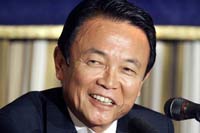Japan prepares to welcome its new prime minister Fukuda
Yasuo Fukuda was elected prime minister by the lower house of parliament Tuesday.

Fukuda garnered 338 votes in the lower house, many more than the 239 needed for a majority. His closest competitor was Ichiro Ozawa, the leader of the opposition Democratic Party of Japan, with 117 votes.
The vote guaranteed Fukuda's installment as Japan's next leader.
Ozawa won the vote in the weaker upper house, controlled by the opposition party, but the lower house decision holds sway under Japanese political regulations.
Fukuda, 71, the first son of a prime minister to also serve in the post, has pledged to keep Japan as a strong U.S. ally in the fight against terrorism, improve relations with Asia, and address growing inequalities in the world's second-largest economy.
The lower house vote came only hours after outgoing Prime Minister Shinzo Abe emerged from hospital to dissolve his Cabinet and formally resign after only a year in office.
Fukuda was selected president of the ruling Liberal Democratic Party on Sunday, and has been setting up his incoming administration since then. He met Tuesday morning with Akihiro Ota, the head of the LDP's New Komei ruling coalition partner, to reaffirm the parties' alliance ahead of the parliamentary vote.
On Monday, Fukuda tapped the heads of three internal LDP factions that had supported him for top party posts, immediately triggering criticism from the opposition that he was rewarding allies with no regard for policy.
His first political order of business will be winning passage of legislation extending Japan's naval mission in the Indian Ocean in support of U.S.-led forces in Afghanistan. The mission started in 2001 after the terrorist attacks in the United States.
The opposition has vowed to use its majority in the upper house to block the measure, but Fukuda has vowed to launch negotiations in search of a compromise.
The opposition remained defiant.
"We are fully prepared to discuss anything with the LDP, but Mr. Fukuda has not presented us his political vision," said Democratic Party executive Kenji Yamaoka.
Fukuda inherits a political scene left in tumult after a year under Abe's troubled leadership.
Abe, who stunned the nation when he announced Sept. 12 that he wanted to quit, emerged Tuesday from the hospital where was being treated for stress-related stomach ailments to officially dissolve his Cabinet.
"I want to extend my apologies to the people for not being able to complete my duties," Abe said in a statement that outgoing top government spokesman Kaoru Yosano read to reporters following the Cabinet's final meeting.
Abe, 53, had faced harsh criticism for abruptly resigning amid a parliamentary battle over the Afghan mission. On Monday he said that he had resigned for unspecified health reasons.
Subscribe to Pravda.Ru Telegram channel, Facebook, RSS!




